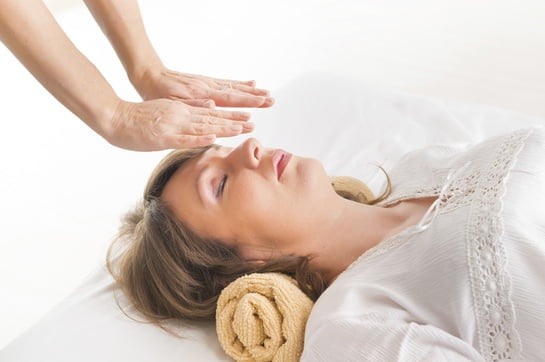Understanding Reiki
Reiki is a traditional Japanese energy healing technique that involves the transfer of universal energy from the practitioner’s hands to their patient. This form of alternative medicine is believed to promote healing, reduce stress and increase overall wellbeing.
How Reiki Works
Reiki operates on the principle that there is a “life force energy” that flows through us, and it is this energy that keeps us alive and well. When one’s life force energy is high, they are more capable of being happy and healthy.
In a Reiki session, the practitioner places their hands lightly on or over specific areas of the head, limbs, and torso using different hand shapes, for between 2 and 5 minutes. The hands can be placed over 20 different areas of the body.
During this time, the practitioner’s hands may become warm and tingly. This is believed to be the Reiki power flowing into the body and balancing the energy.
During the course of a Reiki treatment, if the recipient has specific injuries, say a burn, reiki practitioners adjust their approach, holding their hands just above the wound instead of direct contact. It is through this light contact or proximity over the body, that the transference of energy occurs. Reiki Practitioners may experience a sensation of warmth and tingling in their hands, a signal often associated with the flow of Reiki power into the recipient’s body, working to restore energy balance.
As the life force energy flows through a person’s physical body through pathways like chakras, meridians, and nadis, it also flows around us in a field of energy known as the aura. The life force nourishes the cells and organs of the physical body, supporting them in their vital functions. When this flow of life force is disrupted or blocked, it causes diminished function in one or more of the organs and tissues of the physical body, leading to ailments.
Reiki heals by flowing through the affected parts of the energy field and charging them with positive energy. It raises the vibratory level of the energy field in and around the physical body where the negative thoughts and feelings are lodged. This eliminates energy blockages, straightens the energy pathways, and allows the life force to flow in a healthy, natural way.

The Role of Reiki in Mental Wellness
The interplay between Reiki and mental health stems from the core principle of Reiki – the balancing and harmonizing of the body’s energy. Mental health issues, such as anxiety, depression, and stress, are often associated with disruptions or imbalances in our body’s energy flow. Reiki, with its energy healing technique, seeks to restore this balance, thereby fostering a conducive environment for mental healing.
During a Reiki session, as the practitioner transfers positive energy into the body, it clears blockages and enhances the life force energy flow. This process induces a deep state of relaxation, which in turn aids in reducing stress levels and promoting emotional healing. It’s akin to rebooting the body’s energy system, flushing out negativity, and refilling it with positive, life-affirming energy. As a result, individuals often report feeling lighter, calmer, and more at peace after a Reiki session.
Moreover, Reiki is not just a reactive approach to mental health issues, but can also be a proactive one. Regular Reiki practice can help reinforce mental resilience, fortifying individuals against future stressors and emotional turbulence. Therefore, Reiki can form an integral part of a holistic mental wellbeing regimen, complementing other forms of therapy and medication.
Benefits of Reiki for Mental Wellness
- Promotes Deep Relaxation: Reiki induces a deep state of relaxation, allowing the body and mind to release stress and tension. This state of tranquility aids in enhancing overall mental wellness.
- Improves Emotional Well-being: By balancing the body’s energy, Reiki helps to cleanse negative emotions, leaving individuals feeling lighter and emotionally balanced.
- Boosts Mental Clarity: Reiki can help clear the mind, improving focus and clarity. This can lead to better decision-making and problem-solving abilities.
- Helps in Reducing Anxiety and Depression: Many individuals report a significant reduction in feelings of anxiety and depression following Reiki sessions. By balancing the body’s energy, Reiki can help mitigate these mental health issues.
- Fosters Inner Peace and Harmony: Reiki promotes a greater sense of inner peace and harmony, which can be a valuable tool in managing mental health and maintaining overall emotional wellness.
- Enhances Resilience to Stress: Regular Reiki practice can increase resilience to stress and aid in managing stressful situations more effectively by maintaining a balanced and peaceful state of mind.
- Improves Sleep Patterns: Many people find Reiki improves their sleep quality and patterns, which is a vital aspect of maintaining good mental health.
- Complements Traditional Mental Health Treatments: Reiki is a safe and non-intrusive method that complements traditional mental health treatments and can enhance their effectiveness.
Reiki for Stress Management
Understanding Stress and Its Effects
Stress can be broadly defined as the body’s response to any demand or pressure. It is typically triggered when we perceive a situation to be challenging or threatening. While a certain level of stress can drive us to meet daily challenges and motivate us to reach our goals, chronic stress can have serious health implications.
When we encounter stress, our body responds by activating the nervous system and releasing hormones like adrenaline and cortisol. These hormones prepare the body for a ‘fight or flight’ response by increasing heart rate, blood pressure, and glucose levels. While this response can be beneficial in handling short-term challenges, continual activation of this system due to chronic stress can lead to wear and tear on the body, both physically and mentally.
Mental effects of stress may include feelings of constant worry, difficulty concentrating, mood swings, irritability, and difficulty sleeping. Physically, stress can lead to a weakened immune system, high blood pressure, heart disease, obesity, and other health problems. Additionally, stress can exacerbate existing mental health issues, such as depression and anxiety disorders. Therefore, effective stress management techniques, such as Reiki, can play a crucial role in maintaining mental wellness and overall health.
How Reiki can help manage stress
Reiki serves as an effective tool in managing stress by enabling individuals to achieve a state of deep relaxation, which in turn aids in the reduction of stress and anxiety. By focusing on balancing the body’s energy, Reiki assists in dispelling the negative energy often associated with stress, replacing it with positive, life-affirming energy.
This restoration of energetic balance allows individuals to better cope with stressors, leading to a more serene and peaceful state of mind. Regular Reiki sessions can equip individuals with an enhanced capacity to handle future stress, as well as alleviate the symptoms of chronic stress, contributing to better overall mental wellness.
Techniques in Reiki for Stress Management
There are several Reiki techniques that can be employed for effective stress management. Here are a few of them:
- Centering and Clearing: This involves focusing your awareness on the present moment and clearing your mind of all distractions. The practitioner places their hands on your forehead and back of your head, helping you to center your thoughts and achieve mental clarity.
- Balancing Chakras: Every person has seven main chakras, or energy centers, in their body. Stress and anxiety can block these chakras, disrupting your body’s energy flow. The practitioner channels energy into your chakras to clear these blockages and restore balance.
- Aura Cleansing: In this technique, the practitioner uses their hands to smooth out or brush away the energy field surrounding your body, known as your aura. This can help remove negative energy and stress, leaving you feeling more calm and relaxed.
- The Five Reiki Principles: Practicing the five Reiki principles can also aid in stress management. These principles are: Just for today, I will not be angry; Just for today, I will not worry; Just for today, I will be grateful; Just for today, I will do my work honestly; Just for today, I will be kind to every living thing. Reciting these principles daily can help manage stress by encouraging a positive mindset.
- Distance Reiki: If you cannot physically attend a Reiki session, distance Reiki is a viable alternative. The practitioner can send energy to you remotely, helping you to relax and relieve stress.
- Self-Reiki: You can also perform Reiki on yourself to manage stress. Placing your hands on areas such as your head, heart, or stomach, where stress is often felt, can help you relax and reduce feelings of anxiety.
By regularly incorporating these Reiki techniques into your lifestyle, you can manage stress effectively and enhance your overall mental well-being.
Reiki and Other Wellness Practices
Reiki and yoga are both holistic practices that seek to balance the body’s energy to promote overall wellness. In many ways, they complement each other beautifully. Yoga cultivates balance and harmony through physical postures, breath control, and meditation, aiming to unify the mind, body, and spirit.
On the other hand, Reiki focuses on energy healing, channeling positive life force energy to restore balance, promote healing, and foster a sense of tranquility. When combined, these two practices can amplify each other’s effects, creating a potent wellness regimen. The deep relaxation and energy balance achieved through Reiki can enhance the mindfulness and body awareness cultivated in yoga, leading to a more profound and transformative experience. Similarly, the physical and mental discipline of yoga can make one more receptive to Reiki’s healing energy, thereby maximizing the benefits of a Reiki session. By integrating Reiki and yoga into your wellness routine, you can tap into a synergistic approach to stress management, mental wellness, and holistic well-being.
The holistic approach to mental wellness and stress management
A holistic approach to mental wellness and stress management encompasses a comprehensive view of health, where mental, physical, and emotional well-being are interconnected and equally vital. This method emphasizes the balance of mind, body, and spirit, understanding that imbalance in one area can impact the others.
One of the primary principles of a holistic approach involves nurturing self-awareness and mindfulness. Mindfulness exercises, such as meditation and controlled breathing, can help individuals become more attuned to their thoughts, emotions, and body, fostering a deeper understanding of their stress triggers and mental wellness needs.
Another key aspect of this approach is the emphasis on natural and non-invasive therapies, such as Reiki, yoga, and other energy healing techniques. These practices aim to restore balance to the body’s energy, promoting relaxation, reducing stress, enhancing resilience, and improving overall mental wellness.
Furthermore, the holistic approach encourages a balanced lifestyle, emphasizing the importance of nutritious food, regular physical activity, adequate sleep, and positive social interactions. These factors can profoundly influence mental wellness, reinforcing the body’s resistance to stress, promoting emotional stability, and fostering a positive mental outlook.
By integrating these principles into everyday life, individuals can cultivate a holistic approach to mental wellness and stress management, enabling them to navigate life’s challenges with greater ease, resilience and positivity.
Reiki offers a gentle, non-invasive means to support mental wellness and stress management. By restoring balance to the body’s energy, it cultivates a deep state of relaxation, enables emotional healing, and bolsters resilience against future stressors. Furthermore, when combined with other holistic practices like yoga and a balanced lifestyle, Reiki can form a formidable part of a comprehensive approach to mental wellness. As we navigate through the stresses of modern life, such integrative and holistic practices can serve as vital resources in our quest for peace, balance, and overall well-being.
